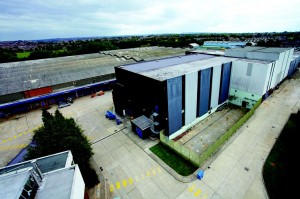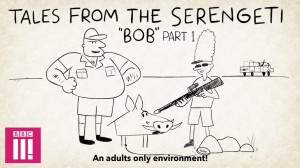A combination of tax breaks, talent and location choices has lured UK and US film and TV production firms to the West of England over recent years – sparking a dramatic episode of growth for the regional industry’s fortunes.
Bristol alone is now the third largest film and television centre in Britain and punches well above its weight for a city of just 428,000 people. 
With a long tradition in TV and film-making thanks to the BBC Natural History Unit and Oscar-winning Aardman Animations, recent years have seen Bristol capitalise on this strength with the founding of The Bottle Yard Studios, pictured right, and a raft of small production houses emerging to expand the city’s already generous talent pool.
The introduction of tax breaks for the TV and film industry in 2009 provided a major boost by attracting more US money to the UK, and encouraging the making of big budget TV dramas.
As a result, the TV and film industry in and around Bristol generated an estimated £158m last year, according to a new report from UWE that highlights the importance of the sector to the local economy.
“The introduction of tax relief for films and TV drama has been a big help as it led to an influx of productions coming to the UK  and London,” Natalie Moore, pictured left, of the Bristol Film Office explained.
and London,” Natalie Moore, pictured left, of the Bristol Film Office explained.
“London has been overstretched so production teams have started to look elsewhere for studio facilities and Bristol, within easy reach of the capital, has benefitted.”
Since the founding of The Bottle Yard Studios in 2010, major TV dramas such as Wolf Hall, Poldark, (pictured below), and Sherlock, have been filmed there.
The region’s rich creative output was highlighted at the Royal Television Society (RTS) West of England awards last Sunday where Sherlock, Jago: A Life Underwater and Planet Earth II were the big winners. 
The number of days filming in Bristol has increased by more than 50% in the past four years, from 611 in 2012/13 to 943 in 2015/16.
But the tax relief has also encouraged other regions to start competing in this arena, creating their own improved studio spaces.
If Bristol is to maintain its position as a leading TV and film production hub, it must continue to focus on fostering new talent and attracting top-quality productions by offering great value for money and unbeatable service.
“It is becoming more and more competitive as other areas are picking up on the appeal of attracting this kind of work and building studio spaces,” says Natalie.
“Other regions have started to really push to get productions to come to them. It is difficult to compete with areas that have production funds so can offer financial returns to productions, we are not able to do that so we have to tackle that challenge by offering an excellent service. We cannot rest on our laurels.”
 Fiona Francombe, pictured left, site director at The Bottle Yard Studios, remains optimistic.
Fiona Francombe, pictured left, site director at The Bottle Yard Studios, remains optimistic.
“It is no mistake that Bristol is doing as well as it is and it would be naïve to think something will open elsewhere and suddenly all the work will go there. We have to hold our nerve with it,” she says.
“Production models here have very simple spaces so we can keep our costs low. The moment you start building bespoke sets and facilities with special features you have to charge far more for it.
“There’s a perception that there’s lots of money out there, with all these high-end dramas being made with US investment. But for those productions to work a lot of money is spent on casting, composers, designers and all the above the line costs.
“The money for below-the-line stuff to actually make it, like lighting, cameras, studios facilities and crew has not increased much and production companies are still looking for a good deal. Our business model is one that works.”
Created on the site of a former bottling plant, The Bottle Yard Studios opened in 2010 as a partnership initiative with Bristol City Council but receives no subsidies or financial support from City Hall.
“We have to be cost-neutral or create a surplus,” Fiona explains. 
Of the £158m generated by the industry in Bristol, £140.3m was via independent film and TV companies in the city while £17.7m was inward investment from companies based outside choosing to use its locations and facilities such as The Bottle Yard Studios.
The city was given a useful head start long before the tax changes 2009, thanks to the BBC’s Natural History Unit, which has been based in Bristol since 1957. It produces about 100 hours of television and 50 hours of radio every year – attracting a stream of talented TV and film-makers to the region for more than half century.
The success of the region’s TV and film industry also has its roots in Bristol’s unique range of locations with coastline, countryside, historic buildings and urban landscapes all within easy reach.
“Bristol’s appeal is that we’ve got a huge variety of locations on our doorstep, coastline, rural, urban and amazing heritage buildings, all very nearby.” Natalie says.
“Bristol also has an excellent crew base and post production houses all in one place. Even the biggest productions we’re getting for the city now, that may go further afield for locations, can still get the full service they need in the city.”
This is echoed by Miles Bullough, pictured above right, who set up Wildseed Studios in Bristol four years ago with Jesse Cleverly, after 10 years working at Aardman.
“The benefit of Bristol is that it is easy to attract talented people to the city,” he says.
“The emergence of The Bottle Yard as a major location for high-end drama has been very beneficial for the whole area because we now get really good crews down here.
“But the importance of the BBC natural history programming, which has such a high profile, being in Bristol cannot be underestimated. Then there’s Aardman, which has been producing world-class animation for 40 years.
“All this has made it much easier to attract talent to the city which has been key to the growth of the industry.”
 Wildseed operates as an incubator for creative productions, specialising in animation. It raises money through private investor and invests £10,000 in new projects, often targeting the millennial audience by broadcasting online or via social media, rather than traditional television.
Wildseed operates as an incubator for creative productions, specialising in animation. It raises money through private investor and invests £10,000 in new projects, often targeting the millennial audience by broadcasting online or via social media, rather than traditional television.
In the four years since its founding, Wildseed has received 3,000 applications, invested in 30 projects, about 20 of which have been made into programmes, web series or low-budget movies.
Wildseed’s productions including Tales from the Serengeti (pictured above), The Darkest Dawn and Wolf Jenkins have been picked up by US programmers, Channel 4 and BBC 3.
Miles believes it is the combination of creativity with Bristol’s strong tech and digital sector that gives the city its unique strength.
“It’s a really exciting time,” he says. “There’s a very strong interactive and digital community down here which is going from strength to strength, with big companies like e3 and Aardman which are very strong in the digital space.
“Then the Watershed provides a great hub of creative excellence through its Pervasive Media Studios, this really helps drive the creative media in the area.”
So, what could topple Bristol from its lofty position as a leading TV and film producing city?
It depends who you ask.
Many are concerned about the longer-term impact of Brexit, which may have a damaging impact on the UK’s TV and film exports to the continent.
There are also worries over the UK’s departure from the EU preventing talented TV and film-makers from other European countries coming to Bristol.
Miles says: “The EU is a huge export market for us and anything that harms our ability to sell our products could be very damaging.”
But Fiona Francombe expresses a different concern: “A lot of people talk to me about Brexit but I don’t see it being that much of an issue although we don’t know what will happen with interest rates poised to go up and things.
“My biggest worry is that Donald Trump will pass a law preventing all the big production companies in the US making things overseas. Our TV and feature films rely heavily on US money coming in so that would be hugely damaging.”
All agree that key to tackling many of the challenges ahead is a focus on training talented youngers in the region to join the industry and promoting greater diversity.
“There are really great people coming up through the ranks via the universities and colleges but many of them go to London to find work,” said Natalie.
“We need to nurture this local talent to keep it in the city. Film and TV is often seen as being incredibly competitive and impossible to break into and we want to try and challenge that and encourage more people to go for it as there are so many different routes – it is not all about doing a media degree. You could be a carpenter or an electrician.”
Fiona concludes: “We need to be more diverse. Film and TV is an embarrassingly white, middle-class industry.
“Everybody is saying it now, there is a real appetite to change this. BBC Bristol and all the major organisations need to keep working with the educational establishments in the city to try and change this and ensure the industry is representative of Bristol and the South West as a whole.”





























